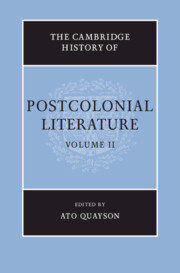Book contents
- Frontmatter
- 21 The language question in India and Africa
- 22 English and the development of postcolonial literature
- 23 Religion and postcolonial writing
- 24 Postcolonial responses to the Western canon
- 25 Island writing, Creole cultures
- 26 Magical realism
- 27 Palimpsest and hybridity in postcolonial writing
- 28 The narrative forms of postcolonial fiction
- 29 Poetry and postcolonialism
- 30 Primitivism and postcolonial literature
- 31 Popular culture and postcolonial literary production in Africa and India
- 32 Film and postcolonial writing
- 33 Fanon, Memmi, Glissant and postcolonial writing
- 34 Negritude and postcolonial literature
- 35 Publishing, prizes and postcolonial literary production
- 36 Key journals and organizations
- Bibliography
- Index
- References
28 - The narrative forms of postcolonial fiction
Published online by Cambridge University Press: 28 January 2012
- Frontmatter
- 21 The language question in India and Africa
- 22 English and the development of postcolonial literature
- 23 Religion and postcolonial writing
- 24 Postcolonial responses to the Western canon
- 25 Island writing, Creole cultures
- 26 Magical realism
- 27 Palimpsest and hybridity in postcolonial writing
- 28 The narrative forms of postcolonial fiction
- 29 Poetry and postcolonialism
- 30 Primitivism and postcolonial literature
- 31 Popular culture and postcolonial literary production in Africa and India
- 32 Film and postcolonial writing
- 33 Fanon, Memmi, Glissant and postcolonial writing
- 34 Negritude and postcolonial literature
- 35 Publishing, prizes and postcolonial literary production
- 36 Key journals and organizations
- Bibliography
- Index
- References
Summary
Introduction
There was a knock on the door. I haven’t done this to you too often, have I, Ganapathi? Stretching the limits of coincidence unacceptably far? I mean, it’s not always in this narrative that a character has said, ‘It would be really convenient if the sky were to fall on us right now’ – and the sky has fallen on the next page. Fair enough? So do you think you can excuse me now if a sweat-stained despatch-rider bursts into the room and announces that Manimir has been invaded by Karnistani troops?
Since Salman Rushdie’s Midnight’s Children (1981) South Asian postcolonial literature in English has not merely become a major publishing success, but it has also acquired the hallmark of academic respectability owing to its exuberant intertextual playfulness, self-reflexive toying with the narrator–reader relation, its sheer inventiveness and expansive magic realist fabulation. Two labels helped to place Rushdie and his followers like Shashi Tharoor, Sunetra Gupta or Arundhati Roy among the literary elite: the affinity to the already canonized magic realism of South American provenance (Vargas Llosa, Gabriel García Márquez, Julio Cortázar, Alejo Carpentier, Carlos Fuentes) and the postmodernist narrative techniques employed by Rushdie and others (selfreflexivity, parody, extensive use of analepsis, metalepsis and paralipsis, montage, subversion of ontological distinctions, metafiction). In fact, in hindsight, Rushdie’s (and Tharoor’s) works can now, more specifically, be categorized as historiographical metafictions, a prominent subcategory of postmodernist writing.
- Type
- Chapter
- Information
- The Cambridge History of Postcolonial Literature , pp. 903 - 937Publisher: Cambridge University PressPrint publication year: 2012
References
- 5
- Cited by



